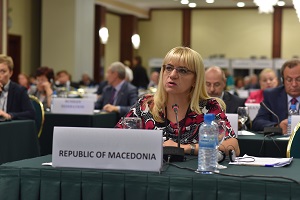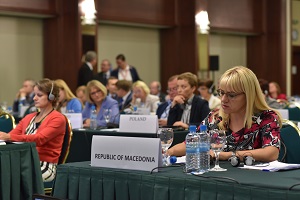 Saturday, 1 October 2016
Saturday, 1 October 2016
ADDRESS BY MS. RENATA DESKOSKA, VICE-PRESIDENT OF THE ASSEMBLY OF THE REPUBLIC OF MACEDONIA ON SESSION II: DEVELOPING DEMOCRATIC INSTITUTIONS AND HUMAN RIGHTS IN SOUTH EAST EUROPE – THE ROLE OF THE OSCE
OSCE is a regional organization founded on a comprehensive approach to security which directly links security to democratic values. OSCE policies related to promoting democracy have a wide scope and they are an integral part of the security dialogue, cooperation and standards the Organization aims to promote. Through the Helsinki Final Act of the 1970s and several important documents from the early 1990s, OSCE has built an extensive body of human dimension commitments, which entails all the essential ingredients of democracy and with it good governance, the rule of law, parliamentary oversight, election standards and procedures, civil society, media freedom and civil-military relations.
In the region of Southeast Europe, OSCE has made a significant contribution to achieving the goal: an undivided Europe, wholly at peace and fully free. Through its field missions, the High Commissioner on National Minorities, the High Representative on Freedom of the Media, the Secretariat and the Office for Democratic Institutions and Human Rights (ODIHR) and the Parliamentary Assembly, OSCE has actively worked on supporting the democratic institutions of countries in the region. The activities encompassed security dialogue, conflict management, standardization and monitoring of the commitments in all three dimensions, political-military, economic and human dimension, as well as assistance in democratization.
OSCE was deeply involved in the conflict management in the Balkans and through its missions it focused on the process of building confidence in former crisis regions, on institution building, on the rule of law and the civil society. With its engagement in the region, OSCE covered almost every aspect of democratization; building capacities and good governance by national and local authorities, parliamentary oversight, rule of law and the judiciary, the development of political parties, civil-military relations, gender issues, media and support to the civil society. In the 1990s, the Republic of Macedonia, as a country in transition, was faced with the challenge to carry out deep social and economic reforms and to adopt or amend hundreds of laws in a relatively short time frame, and the support we received from the OSCE and its institutions related to the development and strengthening of democracy, were particularly valuable. The activities aimed to provide assistance in reforming the police force into transparent and accountable structures were also very significant.
 We also recognise the important work of the Parliamentary Assembly of the OSCE and ODIHR in their support for holding free elections and we expect for them to have an active role in the upcoming early parliamentary elections in the Republic of Macedonia, scheduled for December 11, this year. Parliamentary Assembly of the OSCE has been regularly sending its delegations to various elections in the Republic of Macedonia, as part of the international election observation and assessment missions and their recommendations should be accepted as an expression of support for the improvement of the election process and our overall democratic development and they are always receive our greatest attention.
We also recognise the important work of the Parliamentary Assembly of the OSCE and ODIHR in their support for holding free elections and we expect for them to have an active role in the upcoming early parliamentary elections in the Republic of Macedonia, scheduled for December 11, this year. Parliamentary Assembly of the OSCE has been regularly sending its delegations to various elections in the Republic of Macedonia, as part of the international election observation and assessment missions and their recommendations should be accepted as an expression of support for the improvement of the election process and our overall democratic development and they are always receive our greatest attention.
Distinguished colleagues, I believe you share my opinion that human rights and the development of democracy require permanent efforts. Democratization is a continuous process in which internal factors have a decisive role. OSCE, as well as other international organizations, can achieve their normative objectives only to the extent to which there are political will and reform orientation on the part of the authorities in a given country.
The forthcoming parliamentary elections in the Republic of Macedonia are especially important for solving the political, legal and institutional crisis we are facing. One of the mechanisms that should contribute to the solution of the institutional crisis is the establishment of the Special Public Prosecutor. This body initiated procedures for serious crimes committed by the high officials related to the elections.
After the elections, of particular importance will be the support by the OSCE for the start of reform and depoliticisation of the judiciary and other regulatory authorities, and for implementation of the rule of law and the exercise of OSCE standards for democracy and human rights.
The Organization for Security and Cooperation in Europe as the largest regional organization in the world, which has established an impressive body of democratic and human rights standards by implementing a wide range of activities related to democracy in South East Europe, continues to have a major impact on democratization and integration through cooperation.
Thank you.